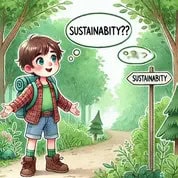Welcome to The Sustainable Classroom Guide. Today, we’re going to talk about a big idea that’s super important for our planet and for all of us: sustainability. You might have heard this word before, but what does it really mean, especially for our young learners?
What is Sustainability?
Let’s break it down in a way that makes sense for everyone, from kindergarteners to fifth graders, and for the amazing educators who guide them.
For Kids: Imagine our Earth is like a giant, wonderful house that we all share. It has everything we need: fresh water to drink, clean air to breathe, yummy food to eat, and beautiful places to play. Sustainability is about taking care of our Earth house and all its treasures so that it stays healthy and happy, not just for us today, but for all the kids who will live here in the future too! It means using things wisely, not wasting, and making sure we don’t use up all the good stuff.
For Educators: At its core, sustainability is about meeting the needs of the present without compromising the ability of future generations to meet their own needs. In the K-5 classroom, this translates into fostering an understanding of interconnectedness – between people, resources, and ecosystems. It’s about nurturing responsible citizens who make conscious choices about consumption, conservation, and community well-being, ensuring a vibrant planet for years to come.
Why Sustainability Matters?
Now, you might be wondering, “Why is this so important right now?”
Well, as former President Barack Obama wisely said, “We are the first generation to feel the impact of climate change and the last generation that can do something about it.”
This isn’t meant to scare anyone, but to empower us all, especially our young learners. It means that the children in our classrooms today are incredibly special. They are the future innovators, scientists, artists, and leaders who will shape our world. By understanding sustainability now, they gain the tools, the knowledge, and most importantly, the passion to tackle big environmental challenges.\
Walk Before You Run
The idea of “sustainability” can sometimes feel overwhelming, like there’s too much to do all at once. But just like learning to ride a bike, you don’t start by racing down a hill. You begin with training wheels, or maybe even just pushing off with your feet.
Bringing sustainability into your classroom doesn’t have to be a massive overhaul. It’s about taking one small, manageable step at a time. Every single effort, no matter how simple, builds momentum and creates a ripple effect. The goal isn’t perfection, but progress. Start where you are, with what you have, and watch how those small changes grow into big impacts.
Your First Step
Ready to take that first step? Here are a few simple, impactful ideas to get started:
Recycle Right!
This is a classic for a reason. Set up clearly labeled recycling bins in your classroom for paper, plastic, and cans. Make it a class job to empty them. Discuss what happens to the recycled materials and why it’s better than sending them to a landfill. It’s a visible, daily reminder of waste reduction.
Meet Your Habitat Helper!
Consider a class pet (if feasible and ethical for your school) like a fish or a plant, or even create a mini-habitat terrarium.
- Discuss what your pet/plant needs to thrive (food, water, shelter, clean air). This naturally leads to conversations about habitats in the wild and why it’s so important to protect them for all living things.
- Read books about animals in their natural homes can spark great discussions about habitat loss and conservation.
Read for the Planet!
Books are incredible gateways to understanding and empathy. Choose literature that inspires a love for nature, introduces environmental heroes, or gently explores eco-challenges. Think stories about trees, oceans, animals, or even kids who make a difference in their communities. After reading, open up a discussion:
- “What did this story teach us about our planet?”
- “What can we do to help, just like the characters in the book?”
Remember, every small step you take, every seed of knowledge you plant, contributes to a greener, healthier future. Let’s embark on this exciting journey together!
Interested in Learning More?
Take a look at some of the other blogs to learn about sustainability in the classroom!
